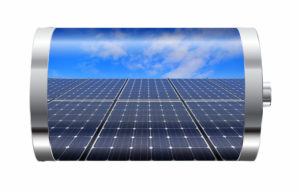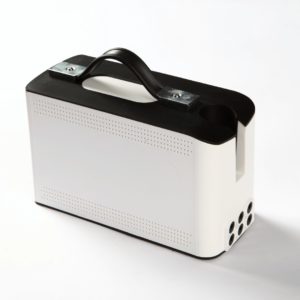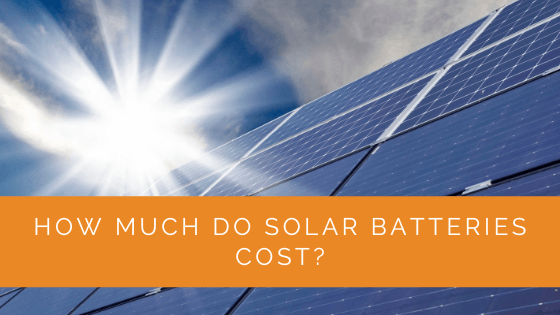The changing environmental landscape has prompted people to look into more sustainable and green options, with homeowners looking far and wide to find new ways of making wise investments.
One such investment can be in the form of solar panels! Given solar power is clean and renewable, solar panels produce electricity free of harmful emissions.
So, anyone with a solar panel system is bound to desire to get their hands on efficient solar batteries. This will allow the individual to store energy generated from the sun to utilize it later.
In simple terms, it gives you energy independence and saves you from massive electricity bills. So, pairing a solar battery with a solar panel gives way to a ‘hybrid solar system,’ which means you never have to worry about a power outage.
If you, too, seek to invest in solar panels but are unfamiliar with how solar batteries work and their cost, you have come to the right place! We have got all your answers for you. So, read on ahead.
Contents
- 1 Key Takeaways
- 2 Functioning of Solar Batteries
- 3 The Cost of Solar Battery Storage Systems
- 4 Factors that Impact the Solar Battery Costs
- 5 FAQ
- 6 Case Study: Optimizing Solar Battery Costs for a Residential Installation
- 7 Expert Insights From Our Solar Panel Installers About The Cost of Solar Batteries
- 8 Experience Solar Excellence with Us!
- 9 Wrapping Up
Key Takeaways
- Solar batteries allow individuals to store excess energy generated by solar panels, providing energy independence and potential cost savings on electricity bills.
- The cost of solar battery storage systems can range from $200 to $15,000, depending on factors such as battery chemistry, manufacturer, and the number of batteries installed.
- Various factors impact the cost of solar batteries, including the type of battery, its capacity, installation labor, and available rebates and incentives. The average lifespan of a solar battery is 5-12 years.
Functioning of Solar Batteries
Solar panels work best during the daytime, especially at noon. This is also the hour when there is the least energy consumption.
On average, a solar panel system creates about 170 to 350 watts in one hour. Assuming a standard grid-tied solar panel system, all the excess solar energy returns to the utility grid. But, if you have a solar battery attached to your solar panel, every extra watt of energy is stored in the battery.
Subsequently, this battery-stored energy helps provide backup power when the sun goes down. This means you no longer have to rely heavily on electricity, and you are likely to save a lot of energy costs.
In short, day or night, rain or sunshine, your house will always be lit up if you invest in good solar battery storage!
The Cost of Solar Battery Storage Systems
A solar battery installation costs about $200 to $15000. This range of price relies on the battery chemistry. On the other hand, the solar panels for the residential grid that are usually coupled with lithium-ion batteries can cost about $7000 to $14000.
Additionally, other lead-acid batteries with small capacities are usually around $200. Although, these are not powerful enough to serve power throughout your house. You can use them as emergency backup power in RVs, sheds, etc.
Interestingly, the cost of solar batteries has dipped in recent years, but it still costs a decent amount. As such, people usually hesitate while investing in solar batteries. However, with the 30% federal solar tax credit and many other additional incentives, purchasing solar batteries is easy on the pocket.

Factors that Impact the Solar Battery Costs
The varying price fluctuations in different solar batteries are due to the following factors:
Manufacturer
As with everything else, a solar battery’s cost is highly determined by the brand manufacturing it. Different brands offer a range of varied features and services. Additionally, every brand has a peculiar manufacturing process. For example, Tesla Powerwall 2 costs just about $10,500. But Sonnen, a German manufacturer, offers a great line of luxury batteries worth $30,000 and beyond.
Battery System Chemistry
You can find an extensive range of batteries with differing internal chemistry in the market. In residential areas, lithium-ion batteries are among the most popular solar batteries. These batteries also have two specific chemistries involved.
One is the Nickel Manganese Cobalt (NMC), and the other is Lithium Iron Phosphate (LFP). NMC is more inexpensive than the LFP batteries and has been in the market for much longer. You can also find lithium polymer batteries that are pretty safe, handy, and secure for usage.
Other solar options that a homeowner generally leans towards are sealed lead-acid batteries. They are easy on the pocket but have little capacity. Additionally, they require consistent maintenance and have a short lifespan. On the other hand, a saltwater battery that uses sodium to conduct electricity makes the best of a liquid saltwater solution to capture, store, and disseminate the energy. They are also safe, last longer than 5000 cycles, are easily recyclable, need little maintenance, and are eco-friendly.
Lastly, there are deep-cycle batteries and solar gel batteries as well. The former solar energy system offers constant power over some time, while the latter is perfect for people who move around often. This is because they are rough and can handle a decent amount of traveling.
Number of Solar Batteries
This is pretty obvious. If you install multiple batteries, the energy storage system will be expensive. To figure out how many solar batteries are required for your solar panel to work aptly, be mindful of these factors:
- The length of hours for which your appliances are actively used
- The number of appliances requiring battery power
- Number of kilowatt-hours utilized
- The battery’s capacity
Generally, even after considering a power outage, the battery bank of one or two solar batteries is enough for everyday electrical work. There is also enough excess electricity to power up some necessary circuits.

Backup Load Panel
Solar batteries are only equipped to power key appliances in your house- from lights to the fridge. But, if you need to run heavy appliances, say an air conditioner, you would need additional batteries. One battery capacity does not have enough battery backup for the entire house. Hence, there might be a need to install a sub-panel.
Such a sub-panel, a backup load panel, or a critical load panel can cost installation charges of $1000-$2000.
Cost of Labor
A solar battery’s price differs from the labor required during installation. If the solar battery systems, aka the solar battery and panel, are installed simultaneously, the labor cost might be low. It’s because all the electrical work for both pieces of equipment can be done simultaneously.
But, if a solar battery is being installed to the existing system of the panel, there will be extra costs as additional electrical material would be required, and newer permits need to be filed.
Rebates, Incentives, and Benefits
Different areas have different solar battery incentives, which one can avail of at the time of solar battery system installation. For example, Oregon provides various solar battery programs that minimize upfront costs. On the other hand, California has come up with SGIP, a solar battery incentive program that pays for one-quarter of battery installation costs.
Additionally, an extra 30% is waived from the total battery installation cost if you pass for the federal solar tax credit. You should also check out the different incentives offered by your state.
FAQ
What Is the Average Lifespan of A Solar Battery?
The average lifespan of a solar battery is about 5-12 years. However, this number goes up to 15 years for high-quality batteries. Additionally, the lifespan of batteries also depends on the frequency and depth of discharge.
What Are Some Factors that Affect Solar Battery Cost?
Several factors can affect the cost of a solar battery, including the type of battery, its capacity, the number of batteries required, and installation costs.
What Is the Average Cost of A Solar Battery?
The average cost of a solar battery is about $5,000-$7,000. However, this price can vary depending on the type of battery and its capacity.
Are Solar Batteries Worth It?
Solar batteries can provide several benefits, including backup power during outages, reducing dependence on the grid, and saving money on your electricity bill. However, solar batteries can be a significant investment, so weighing the pros and cons before deciding is important.
Case Study: Optimizing Solar Battery Costs for a Residential Installation
Background
At Solar Panels Network USA, we pride ourselves on providing tailored solar solutions that meet our clients’ unique needs. Recently, we worked with a homeowner in Albany, New York, who wanted to maximize the benefits of their solar panel system by integrating solar batteries.
Project Overview
The homeowner sought to achieve energy independence and reduce their reliance on the grid, especially during frequent power outages in their area. They were concerned about the costs associated with installing solar batteries and needed a solution that offered both reliability and cost-effectiveness.
Implementation
To address the homeowner’s concerns, we implemented a multi-step approach:
- Customized Battery Selection: We assessed the homeowner’s energy consumption patterns and recommended a lithium-ion battery system, specifically the Nickel Manganese Cobalt (NMC) chemistry, known for its cost-effectiveness and efficiency.
- Incentives and Rebates: We helped the homeowner take advantage of federal solar tax credits and local incentives available in New York. This significantly reduced the upfront costs.
- Smart Energy Management: We integrated a smart energy management system to optimize the usage of stored energy, ensuring maximum efficiency and cost savings.
- Professional Installation: Our team ensured the solar battery system was seamlessly integrated with the existing solar panel setup, minimizing additional labor costs and enhancing overall system performance.
Results
The project yielded outstanding results:
- Cost Savings: By utilizing available incentives and selecting cost-effective battery chemistry, the homeowner saved approximately 30% on the initial installation costs.
- Energy Independence: The integrated battery system provided reliable backup power during outages, significantly reducing reliance on the grid.
- Long-term Benefits: The homeowner experienced a reduction in their monthly electricity bills, and the smart energy management system ensured optimal use of stored energy, enhancing overall savings.
Summary
Our project in Albany, New York, demonstrates the significant benefits of integrating solar batteries with solar panels. By selecting the right battery chemistry, leveraging available incentives, and implementing smart energy management, we helped the homeowner achieve energy independence and substantial cost savings. At Solar Panels Network USA, we are committed to delivering customized solar solutions that maximize the benefits for our clients, ensuring sustainable and cost-effective energy solutions.
Expert Insights From Our Solar Panel Installers About The Cost of Solar Batteries
Investing in solar batteries is not just about cost; it’s about energy independence and resilience. With the right battery system, homeowners can significantly reduce their reliance on the grid and enhance their energy security.
Senior Solar Installer
The cost of solar batteries has decreased over the years, making them a viable option for many homeowners. Pairing solar panels with batteries ensures you have power even during outages, providing peace of mind and continuous savings.
Lead Solar Technician
Choosing the right solar battery involves understanding your energy needs and the various incentives available. Proper installation and selection can maximize your return on investment and long-term benefits.
Solar Energy Consultant
Experience Solar Excellence with Us!
Trust in Solar Panels Network USA, where our seasoned experts deliver top-quality solar solutions for homes and businesses nationwide. With a legacy of countless successful installations and a commitment to sustainable energy, we’re your reliable partner in the solar journey. Ready for a brighter, eco-friendly future? Call us now at (855) 427-0058 and harness the sun’s power!
Wrapping Up
The companionship of solar panels with solar batteries has become increasingly common lately.
When combined, the solar battery storage system offers optimal benefits. It’s ideal, especially for homeowners who face frequent power cuts and have no retail net metering. Plus, if the state gives incentives, it becomes even better.
Another perfect reason to go solar (with panels and batteries) is the environment. The solar battery technology is renewable and perfect for home usage or other solar projects.
Go off-grid, enjoy eco-friendly electricity, and save some bills now!
About the Author
Solar Panels Network USA stands at the forefront of solar energy solutions, driven by a team of seasoned solar engineers and energy consultants. With over decades of experience in delivering high-quality solar installations and maintenance, we are committed to promoting sustainable energy through customer-centric, tailored solutions. Our articles reflect this commitment, crafted collaboratively by experts to provide accurate, up-to-date insights into solar technology, ensuring our readers are well-informed and empowered in their solar energy decisions.

